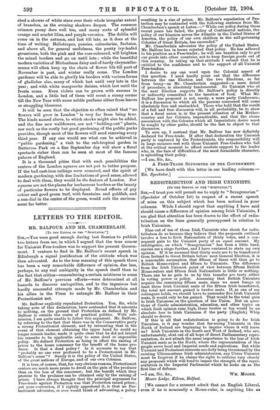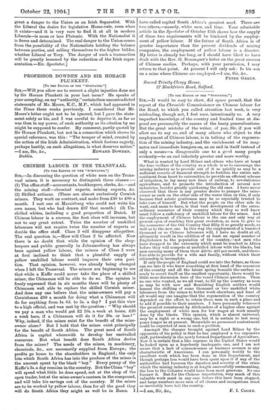trust you will permit me to reply to " Sexagenarian"
(Spectator of October 1st) in respect of a recent speech of mine on this subject which has been noticed in your columns. While I should regret that anything I have said should cause a difference of opinion among Irish Unionists, I am glad that attention has been drawn to the effect of redis- tribution on the lines generally presupposed in relation to Irish Unionism.
Nine out of ten of those Irish Unionists who shout for redis- tribution do so because they believe that the proposals outlined involve a loss to Irish Nationalists of thirty votes, and a con- sequent gain to the Unionist party of an equal amount. My intelligence, on which " Sexagenarian" has been a little hard, carries me a stage further, and I have ventured to state my own opinion. If it be assumed that thirty seats are to be transferred from Ireland to Great Britain before next General Election, it is a reasonable assumption that fifteen of these will then go to British Home-rulers and fifteen to Unionists. The difference from the Irish Unionist point of view between fifteen British Home-rulers and fifteen Irish Nationalists is little or nothing. There can be no gain to us by this transfer pro taste either in voting power or policy. Assuming that British Unionists acquire the remaining fifteen seats, since we must forego at least three Irish Unionist seats of the fifteen Irish transferred, the total net amount gained is twelve seats. If, as one of my colleagues holds, we should have to surrender five Irish Unionist seats, it would only be ten gained. That would be the total gain to Irish Unionism on the question of the Union. But on ques- tions of Castle administration, education, and other topics on which Irish opinion runs high, these twelve or ten would be an absolute loss to Irish Unionism if the party (English) Whip should so decree.
If this is all that redistribution is going to do for Irish Unionism, is it any wonder that far-seeing Unionists in the North of Ireland are beginning to inquire where it will leave us? Irish Unionists in the South and West of Ireland, who are, unfortunately, shut out of all hope of direct Parliamentary repre- sentation, do not attach the same importance to the loss of Irish Unionist seats as in the North, where the representatives of the people serve local and Imperial needs and aspirations. But while Unionist and Protestant interests are daily being threatened by the existing Ultramontane Irish administration, any Ulster Unionist must be foreiven if he claims the right to criticise very closely any proposals which will tend to impair the strength of the repre- sentation in the Imperial Parliament which he looks on as the first line of defence.
—I am, Sir, &c., War. MOORE.
Moore Lodge, Kilrea, Belfast.
[We cannot for a moment admit that an English Liberal, even if he is nominally a Home-ruler, is anything like as great a danger to the Union as an Irish Separatist. With the Liberal the desire for legislative Home-rule, even when it exists—and it is very rare to find it at all in modern Liberals—is more or less Platonic. With the Nationalist it is fierce and determined. The real danger to the Union comes from the possibility of the Nationalists holding the balance between parties, and selling themselves to the higher bidder, whether Liberal or Tory. The danger of such a transaction will be greatly lessened by the reduction of the Irish repre- sentation.—En. Spectator.]











































 Previous page
Previous page